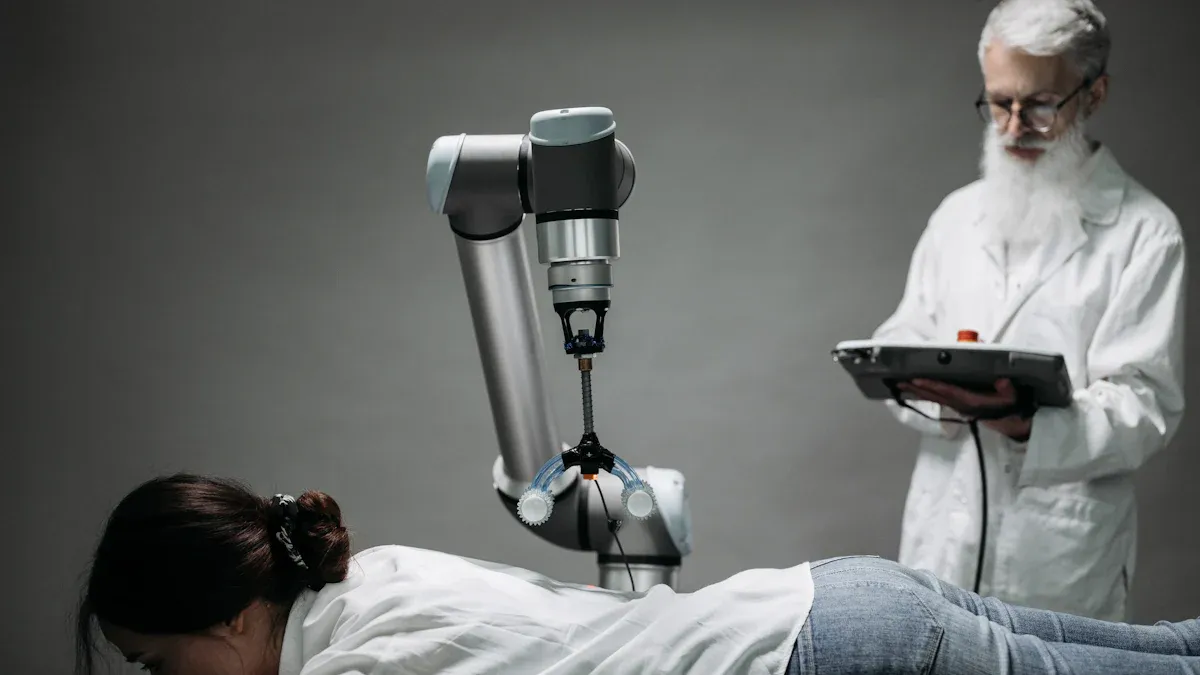How AI is Transforming Cancer Diagnosis and Treatment in 2025

AI is reshaping how you understand and fight cancer. By 2025, its role in healthcare has reached remarkable milestones. For instance, AI models now predict high-risk pancreatic cancer patients with greater accuracy than traditional methods. These tools also identify survival outcomes for breast cancer patients using digital pathology images. Early detection has improved significantly, with AI screening identifying 0.82% of breast cancers compared to 0.70% without it. Moreover, the false-positive rate has dropped, and treatment decisions during surgeries are faster due to AI's ability to expedite genetic subtyping. These advancements highlight why AI in Healthcare: Revolutionizing Cancer Diagnosis is no longer just a concept but a reality.
Key Takeaways
AI helps find cancer early by studying medical images carefully. This makes diagnoses more accurate.
AI changes treatments by creating plans based on your unique genes and body details.
AI lowers mistakes in cancer tests, giving you trustworthy results and less worry.
AI-powered devices track your health live and warn about cancer coming back.
AI handles paperwork in healthcare, so doctors can spend more time with patients and work better.
AI in Healthcare: Revolutionizing Cancer Diagnosis

Enhancing Early Detection
AI-powered imaging algorithms for tumor identification
AI-powered imaging algorithms have transformed how you detect tumors. These tools analyze medical images like mammograms, CT scans, and MRIs with remarkable precision. For instance, AI systems such as Qlarity Imaging’s QuantX have improved cancer detection rates from MRI images by over 35%. They also reduce the time required for radiologists to interpret scans, enhancing efficiency. AI can identify subtle abnormalities that human eyes might miss, ensuring you receive a more accurate diagnosis.
Blood-based multi-cancer detection assays
AI has also advanced blood-based multi-cancer detection assays. These tests analyze biomarkers in your blood to detect multiple cancer types early. By integrating AI, these assays can identify patterns in complex datasets, improving sensitivity and specificity. This means you can benefit from earlier detection of cancers like pancreatic or ovarian, which are often diagnosed at advanced stages.
Improving Diagnostic Precision
Reducing false positives and negatives in tests
AI in Healthcare: Revolutionizing Cancer Diagnosis has significantly reduced false positives and negatives. For example, studies show that AI in mammography screening lowers false-positive rates while maintaining radiologists' decision-making authority. This ensures you avoid unnecessary stress and receive accurate results.
Analyzing complex pathology data with AI
AI excels at analyzing complex pathology data. It processes vast amounts of information from tissue samples, identifying cancerous cells with high accuracy. Tools like Super Vector Machine algorithms outperform traditional methods in diagnostic accuracy, offering you a more reliable diagnosis.
Real-World Applications
Case studies of AI tools in clinical diagnostics
Real-world applications highlight the effectiveness of AI tools. Retrospective studies reveal that AI achieves comparable or superior accuracy to radiologists. Tools like ScreenPoint Medical’s Transpara have increased breast cancer detection rates by over 25% and reduced mammogram reading time by 26%.
Success stories in early cancer detection
Success stories demonstrate how AI improves early cancer detection. For example, AI detects 20–40% of interval cancers missed by radiologists. This means you have a better chance of catching cancer early, leading to improved treatment outcomes.
AI-Driven Advancements in Cancer Treatment

Personalized Medicine
Genetic and molecular profiling for tailored therapies
AI has revolutionized personalized medicine by enabling genetic and molecular profiling for tailored cancer therapies. Advanced AI models analyze vast datasets, including clinical, imaging, and genomic information, to identify the most effective treatments for you. For example, a 2023 study demonstrated how AI integrates 350 parameters from over 15,000 patients with 38 solid tumors to enhance precision medicine. This approach ensures that your treatment plan is based on your unique genetic and molecular profile, improving outcomes and reducing unnecessary interventions.
Evidence Description | Details |
|---|---|
AI Approach | A new AI method integrates diverse data types to personalize treatment. |
Patient Data | Trained on data from 15,000+ patients with 38 solid tumors. |
Parameters Analyzed | 350 parameters, including genetic profiles and imaging data. |
Validation | Tested on 3,000+ lung cancer patients for accuracy. |
Optimizing treatment plans with patient-specific data
AI optimizes treatment plans by analyzing patient-specific data. It predicts how you might respond to therapies like chemotherapy or immunotherapy, ensuring you receive the most effective care. AI tools also provide transparency by explaining how each parameter influences your prognosis, empowering you and your healthcare team to make informed decisions.
Predictive Models for Treatment Outcomes
Forecasting responses to chemotherapy and radiation
AI excels at forecasting treatment responses. For instance, it predicts which patients are likely to benefit from chemotherapy or radiation, helping you avoid ineffective treatments. AI-based scoring of MRI images also assesses tumor aggressiveness, guiding physicians in selecting the best course of action for you.
Identifying potential side effects and complications
AI identifies potential side effects and complications before they occur. By analyzing data from imaging, genomics, and clinical records, AI tools like CADa systems predict patient outcomes and inform treatment planning. This proactive approach minimizes risks and enhances your safety during treatment.
AI in Immunotherapy and Surgery
Enhancing immunotherapy effectiveness
Immunotherapy response rates currently range from 20% to 25%. AI improves these outcomes by identifying patterns that predict which patients will respond to treatment. This ensures you receive therapies tailored to your immune system, increasing their effectiveness. AI also integrates histopathology and molecular data to refine clinical decision-making.
AI-assisted surgical robots for precision surgeries
AI-assisted surgical robots have transformed cancer surgeries. These robots use AI to identify tumor borders with precision, reducing side effects and improving recovery times. For example, AI tools expedite genetic subtyping during brain tumor surgeries, enabling faster and more accurate treatment decisions.

AI's Role in Cancer Research
Accelerating Drug Discovery
Identifying new drug candidates with AI
AI has revolutionized drug discovery by identifying promising new candidates faster than ever before. You benefit from this innovation as AI analyzes vast datasets to pinpoint molecules with the potential to fight cancer. For example:
The average time for drug discovery and preclinical stages traditionally spans six years.
Between 2010 and 2021, AI-intensive pharmaceutical companies advanced 15 drug candidates to clinical trials.
Five of these candidates reached clinical trials in less than the historical average time.
Insilico Medicine achieved a breakthrough by progressing an AI-designed drug candidate to phase I clinical trials in just 30 months.
These advancements mean you could see new cancer treatments reach the market faster, offering hope for improved outcomes.
Reducing time and cost in preclinical research
AI significantly reduces the time and cost of preclinical research. By automating complex processes, AI saves up to 25–50% of the resources typically required. This efficiency allows researchers to focus on developing therapies tailored to your needs.
Enhancing Clinical Trials
AI for patient recruitment and trial design
AI optimizes clinical trials by improving patient recruitment and trial design. It identifies patients most likely to respond to treatments, ensuring you receive the right care. Studies show that trials with fewer outcome measures have better enrollment performance and shorter cycle times. AI also enhances diversity in trials by targeting underrepresented groups, which improves the reliability of results.
Real-time monitoring and analysis of trial data
AI enables real-time monitoring of clinical trial data, ensuring your safety throughout the process. It analyzes trial outcomes quickly, allowing researchers to make adjustments as needed. This proactive approach improves trial efficiency and increases the likelihood of success.
Addressing Data Biases
Ensuring diverse and representative datasets
AI ensures that datasets used in cancer research represent diverse populations. This reduces the risk of biased outcomes and ensures you receive equitable care. Diverse datasets help AI models identify hidden signals in patient imaging, leading to more accurate diagnoses and treatments.
Mitigating disparities in research outcomes
AI plays a crucial role in addressing disparities in cancer research. For instance:
Group | Diagnosis Rate | Mortality Rate |
|---|---|---|
Black Women | 4% less | 40% higher |
White Women | 100% (baseline) | 100% (baseline) |
By training AI models on representative populations, researchers can close these gaps, ensuring better outcomes for everyone.
Auxiliary Applications of AI in Cancer Care
Administrative Efficiency
Streamlining patient records and billing systems
AI has revolutionized how healthcare organizations manage patient records and billing systems. Large hospital chains report a 30% drop in denial rates and a 25% faster billing cycle. Mid-sized clinics have reduced manual coding errors by over 40%, significantly improving staff productivity.
Organization Type | Improvement Description | Efficiency Gain |
|---|---|---|
Auburn Community Hospital | 50% reduction in discharged-not-final-billed cases | 40% increase in coder productivity |
Fresno Community Health Network | 22% decrease in prior-authorization denials | 18% decrease in denials for services not covered |
AI tools also enhance data management efficiency. For example, the MOSSAIC initiative, a collaboration between the National Cancer Institute and the Department of Energy, uses AI to expedite data submissions to the SEER program. This ensures faster and more accurate data handling, benefiting both providers and patients.
Reducing administrative burdens for providers
Administrative tasks often overwhelm healthcare providers. AI-powered programs simplify scheduling, billing, and other duties, allowing you to focus on patient care. Real-time data exchange through AI platforms transforms processes that once took days or weeks into seamless, interconnected workflows. This reduces the burden on providers and improves overall efficiency.
Did you know? 63% of physicians report signs of burnout, and 47% of clinicians plan to leave their jobs within the next two to three years. AI-driven administrative tools can help alleviate this crisis.
Wearable Health Monitoring
AI-powered devices for tracking health metrics
Wearable devices equipped with AI now monitor your health metrics in real time. These devices track vital signs like heart rate, oxygen levels, and activity patterns. AI analyzes this data to detect anomalies, providing you with actionable insights. For instance, smartwatches can alert you to irregularities that may indicate early signs of cancer or other health issues.
Early warning systems for cancer recurrence
AI-powered wearables also act as early warning systems for cancer recurrence. By continuously analyzing your health data, these devices can identify subtle changes that might signal a relapse. Early detection allows your healthcare team to intervene promptly, improving your chances of successful treatment.
Patient Support Systems
AI chatbots for patient queries
AI chatbots provide instant answers to your questions about cancer care. These virtual assistants are available 24/7, offering you reliable information and guidance. They can help you schedule appointments, understand treatment options, and manage side effects, ensuring you feel supported throughout your journey.
Personalized health education and emotional support
AI systems also deliver personalized health education tailored to your needs. They use your medical history and preferences to provide relevant information, empowering you to make informed decisions. Additionally, AI tools offer emotional support by connecting you with resources and communities that address your concerns, helping you navigate the challenges of cancer care with confidence.
AI has redefined cancer care by 2025, offering groundbreaking advancements in diagnosis, treatment, and research.
AI-powered imaging now detects cancers earlier, while machine learning predicts therapy outcomes, helping you receive timely interventions.
Tools like AlphaFold2 accelerate drug discovery, and AI optimizes radiation doses and surgical precision, ensuring personalized care.
Collaboration between AI experts, healthcare providers, and researchers drives these innovations. For example, AI integrates genetic and pathology data to improve decision-making and predicts T-cell responses to enhance immunotherapy.
You play a vital role in supporting continued innovation. Together, we can achieve precision medicine and improve outcomes for all patients.
FAQ
How does AI improve cancer diagnosis accuracy?
AI analyzes medical images and pathology data with high precision. It detects subtle abnormalities that human eyes might miss. This reduces false positives and negatives, ensuring you receive a more accurate diagnosis.
Can AI predict how I will respond to treatment?
Yes, AI uses your genetic and clinical data to forecast treatment outcomes. It predicts how you might respond to therapies like chemotherapy or immunotherapy, helping your doctor choose the best option for you.
Are AI-powered wearables reliable for monitoring health?
AI-powered wearables track vital signs and detect anomalies in real time. They provide reliable insights into your health, acting as early warning systems for potential issues like cancer recurrence.
How does AI help in drug discovery?
AI accelerates drug discovery by analyzing large datasets to identify promising drug candidates. It reduces the time and cost of preclinical research, bringing new treatments to you faster.
Is AI used in cancer surgeries?
Yes, AI-assisted surgical robots enhance precision during cancer surgeries. They identify tumor borders accurately, reducing side effects and improving recovery times for you.
See Also
An In-Depth Overview of Various Cancer Types
Recognizing Symptoms and Treatments for Duodenal Cancer
Exploring Cancer Types Associated with AIDS

